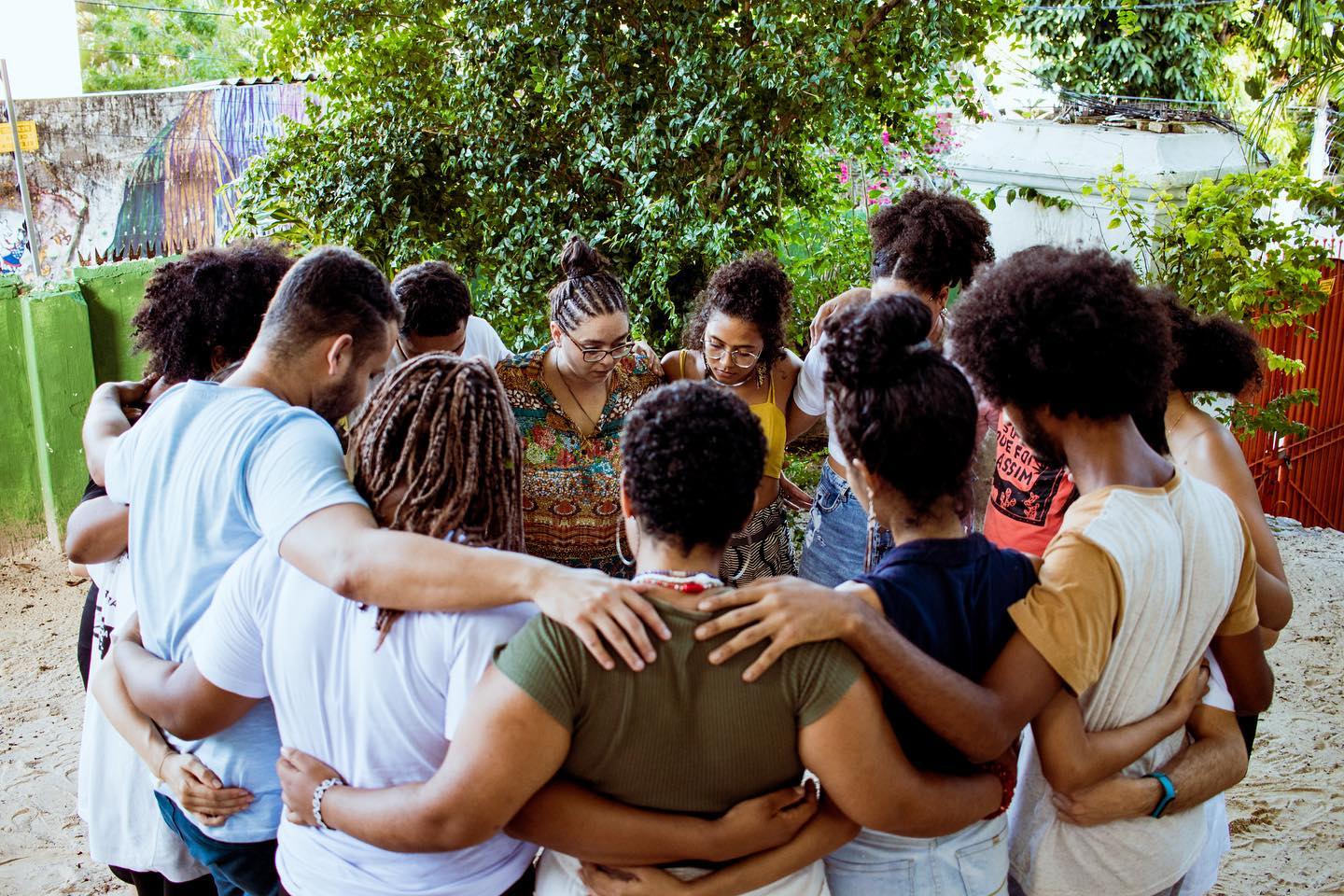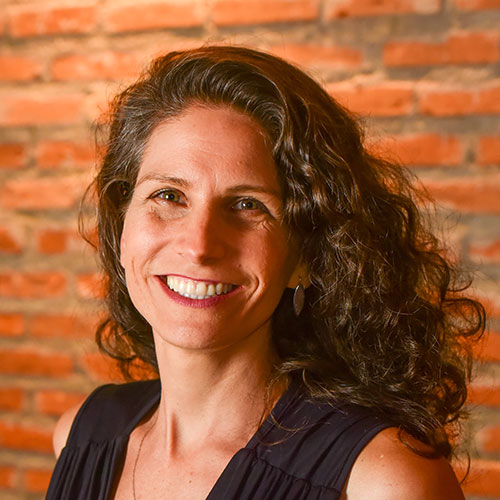Engajamundo focuses on youth and builds a broad network of climate activists in Brazil.
Youth seek to influence agendas on climate change, sustainable communities and cities, biodiversity, and gender.


Engajamundo is an organization that bets on youth to transform the reality of Brazil. Through training, mobilization, advocacy and political participation, the initiative is constituted through a wide network of young climate activists who seek to influence political processes, both at the local and international levels. The main agendas for confrontation are climate change, sustainable communities and cities, biodiversity and gender.
With ten years of operation, Engajamundo has 2,000 members, out of which 250 are currently actively volunteering. The activists work dispersedly. There are communication labs and technology and innovation labs that enable network connections. Additionally, there are 24 local chapters throughout Brazil that function as autonomous groups with their own topics and agendas.
There are also biomes houses, which serve as regional meeting points for local chapters to engage in dialogue and find common parallel agendas. The entire structure aims to empower Brazilian youth to participate in decision-making processes. After all, the so-called generation of the future ends up suffering the consequences of decisions made by the older generation.

Engajamundo
To understand how these young people operate, we interviewed the pedagogue Ana Rosa Calado Cyrus, 26 years old, from Belém do Pará, and the historian Anderson Costa, 22 years old, from Porto Franco, Maranhão. Both started as activists in Engajamundo and now serve on the organization’s Executive Board.
The youth’s protagonism, democracy, human rights… We discussed various topics, primarily focusing on the current moment we are living in and the alternatives to transform this catastrophic scenario presented to us by the imminence of climate change.
Regarding this issue, Anderson Costa gets straight to the point: “We are tired of just trying to survive; we want to truly live, and for that, we need to have the minimum conditions guaranteed. So, what the youth is seeking today is precisely to move beyond the phase of always having to fight for the basics,” he says.
Check out key excerpts from the interview:
Climate activists
“Youth want access to health, safety and employment. We also want to be seen as technical people, because today’s youth do a lot of things, but they don’t get that recognition. We want a ticket on public transport that is cheap. We want access to quality leisure. So, when we talk about a quality environment, climate justice, it is an umbrella fight, because it encompasses all other rights.”
Ana Rosa Cyrus, educator, 26 years old.
Generation of the future
“There is a tremendous burden placed on the youth, saying that we are the future of Brazil. But what are they doing to help us reach that future if we still have to fight for the bare minimum, which is survival? It’s a tremendous responsibility! In last year’s elections, for instance, people would ask: ‘So, youth, what are you going to do to change this game?'”
But in recent years, young people have been prevented from participating in decision-making spaces… Thinking about youth is not just about professionalization, you know? We have countless needs that are not addressed by politics. And when they ignore that and then place the responsibility of changing the country’s future on our shoulders, without allowing us to have a dialogue about our own existence first, it is an immense act of violence.”
Anderson Costa, historian, 22 years old.


Youth and democracy
“We conducted a research study in 2022 called ‘Where are the youth in federal politics?‘. This study revealed the disappearance of youth issues from all government planning over the past four years. These data indicate that rights provided for by the Youth Statute itself have been taken away. Rights of girls and women, of Black people, of Indigenous people, of LGBTQIA+ individuals have also been stripped away.”
So our idea is not to present all the solutions and alternatives to reverse this, but to provide the necessary openness and spaces for youth to be able to build their own forms of advocacy.”
Ana Rosa Cyrus, educator, 26 years old.
Youth empowerment
“Public policies have not seen youth as a priority. And it is us, the youth, who intersect with climate change. So much is said about environmental conservation, the role of youth, that we are the future, that we can make a difference.”
But if there is no incentive for youth, no support if these young people do not have access to the minimum for a satisfactory life, then what kind of future is being built? Engajamundo emerges precisely to raise awareness about this…
It serves as a space of gathering for these young people who, in some way, are thinking of postponing our own end of the world. Because seeking youth empowerment is not just about talking about youth. We also need to be in decision-making spaces. It is necessary to involve youth in the construction of public policies so that we truly have a voice.”
Anderson Costa, historian, 22 years old.


Party politics
“Engajamundo does not have any affiliation with political parties. We are non-partisan, but we are not apolitical, as our organization seeks to understand political processes and participate in decision-making. Since last year, for example, our political engagement has been very focused on questioning the lack of public policies for youth.”
So we conducted research on youth participation in political processes, and we carried out a series of local actions, which were managed by the Rebuliço integration program. About a month ago, we also organized the Advocacy Tour, which brought young people to Brasília to directly engage in dialogue with ministries, secretariats, and so on.
In this process, we were directed to work with the Plano Plurianual – PPA (Multi-Year Plan), which is currently being developed. We launched a proposal for monitoring the budget for youth within the PPA. We also met with Marina Silva, within the Ministry of the Environment, and we are contributing to the construction of the Climate Justice Council.
We seek to engage in dialogue and navigate within these centres of power, but without engaging in partisan politics. Our goal is to demand enduring policies because every four years, the Chamber of Deputies may be renewed, and we want policies that are permanent and do not end in four years.
Ana Rosa Cyrus, educator, 26 years old.
Youth Council
“We are proposing the creation of a Youth Council that intersects with other ministries, precisely in this idea that the environmental agenda does not belong only to the Ministry of the Environment, but also to all the others. We are making these articulations, we have already talked with the Ministry of Racial Equality, the Ministry of Indigenous Peoples.
So today we already have a plurality, a much greater diversity of young people who are thinking together about how we want to be guided. Because until then, for example, there was no Youth Secretariat within the Ministry of the Environment itself. Once again, youth was falling by the wayside.
The idea of the Council arose precisely to have this point of youth within these spaces, to think about climate change, because we will be the most affected. We are the ones who are at this point of greatest vulnerability, along with women and children… we are the ones who are suffering all the impacts.”
Anderson Costa, historian, 22 years old.
Want to support this cause?
Discover the Engajamundo website and follow them on Instagram, Twitter and Facebook.
For more information, email ola@engajamundo.org.



